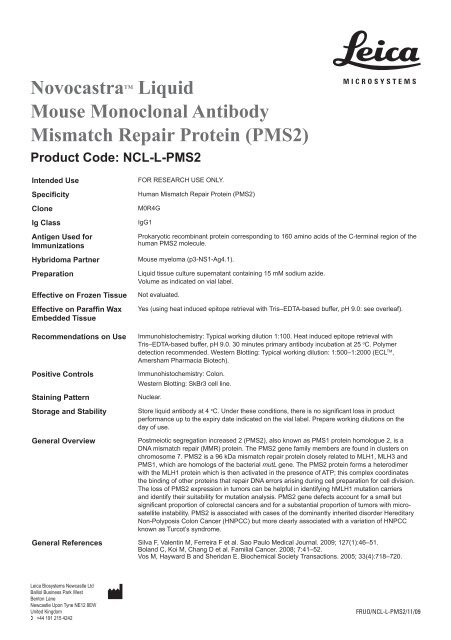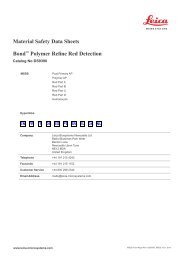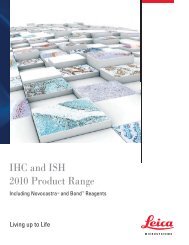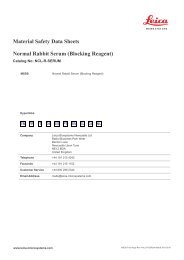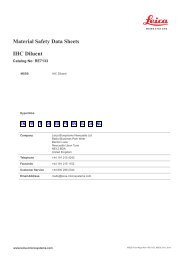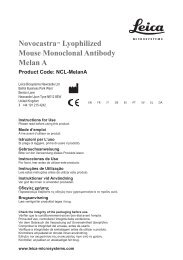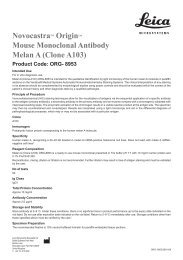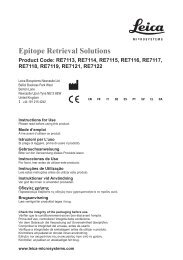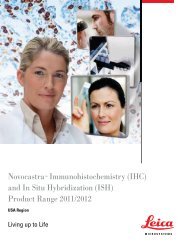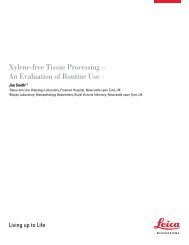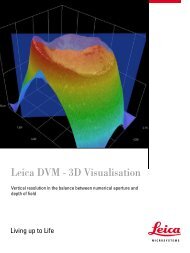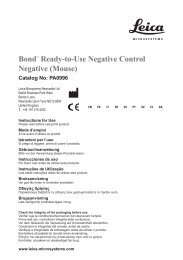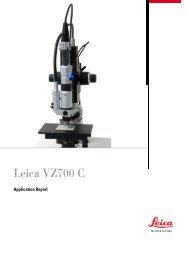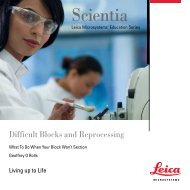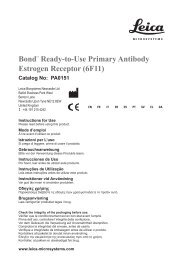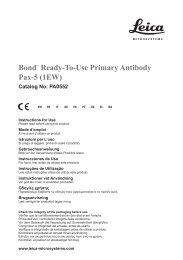PMS2 - Leica Microsystems
PMS2 - Leica Microsystems
PMS2 - Leica Microsystems
Create successful ePaper yourself
Turn your PDF publications into a flip-book with our unique Google optimized e-Paper software.
Novocastra TM Liquid<br />
Mouse Monoclonal Antibody<br />
Mismatch Repair Protein (<strong>PMS2</strong>)<br />
Product Code: NCL-L-<strong>PMS2</strong><br />
Intended Use<br />
Specificity<br />
Clone<br />
Ig Class<br />
Antigen Used for<br />
Immunizations<br />
Hybridoma Partner<br />
Preparation<br />
<strong>Leica</strong> Biosystems Newcastle Ltd<br />
Balliol Business Park West<br />
Benton Lane<br />
Newcastle Upon Tyne NE12 8EW<br />
United Kingdom<br />
( +44 191 215 4242<br />
FOR RESEARCH USE ONLY.<br />
Human Mismatch Repair Protein (<strong>PMS2</strong>)<br />
M0R4G<br />
IgG1<br />
Effective on Frozen Tissue Not evaluated.<br />
Effective on Paraffin Wax<br />
Embedded Tissue<br />
Recommendations on Use<br />
Positive Controls<br />
Staining Pattern<br />
Storage and Stability<br />
General Overview<br />
General References<br />
Prokaryotic recombinant protein corresponding to 160 amino acids of the C-terminal region of the<br />
human <strong>PMS2</strong> molecule.<br />
Mouse myeloma (p3-NS1-Ag4.1).<br />
Liquid tissue culture supernatant containing 15 mM sodium azide.<br />
Volume as indicated on vial label.<br />
Yes (using heat induced epitope retrieval with Tris–EDTA-based buffer, pH 9.0: see overleaf).<br />
Immunohistochemistry: Typical working dilution 1:100. Heat induced epitope retrieval with<br />
Tris–EDTA-based buffer, pH 9.0. 30 minutes primary antibody incubation at 25 o C. Polymer<br />
detection recommended. Western Blotting: Typical working dilution: 1:500–1:2000 (ECL TM ,<br />
Amersham Pharmacia Biotech).<br />
Immunohistochemistry: Colon.<br />
Western Blotting: SkBr3 cell line.<br />
Nuclear.<br />
Store liquid antibody at 4 o C. Under these conditions, there is no significant loss in product<br />
performance up to the expiry date indicated on the vial label. Prepare working dilutions on the<br />
day of use.<br />
Postmeiotic segregation increased 2 (<strong>PMS2</strong>), also known as PMS1 protein homologue 2, is a<br />
DNA mismatch repair (MMR) protein. The <strong>PMS2</strong> gene family members are found in clusters on<br />
chromosome 7. <strong>PMS2</strong> is a 96 kDa mismatch repair protein closely related to MLH1, MLH3 and<br />
PMS1, which are homologs of the bacterial mutL gene. The <strong>PMS2</strong> protein forms a heterodimer<br />
with the MLH1 protein which is then activated in the presence of ATP; this complex coordinates<br />
the binding of other proteins that repair DNA errors arising during cell preparation for cell division.<br />
The loss of <strong>PMS2</strong> expression in tumors can be helpful in identifying hMLH1 mutation carriers<br />
and identify their suitability for mutation analysis. <strong>PMS2</strong> gene defects account for a small but<br />
significant proportion of colorectal cancers and for a substantial proportion of tumors with microsatellite<br />
instability. <strong>PMS2</strong> is associated with cases of the dominantly inherited disorder Hereditary<br />
Non-Polyposis Colon Cancer (HNPCC) but more clearly associated with a variation of HNPCC<br />
known as Turcot’s syndrome.<br />
Silva F, Valentin M, Ferreira F et al. Sao Paulo Medical Journal. 2009; 127(1):46–51.<br />
Boland C, Koi M, Chang D et al. Familial Cancer. 2008; 7:41–52.<br />
Vos M, Hayward B and Sheridan E. Biochemical Society Transactions. 2005; 33(4):718–720.<br />
FRUO/NCL-L-<strong>PMS2</strong>/11/09
Instructions for Use<br />
Heat Induced Epitope Retrieval<br />
Combined With Polymer Detection For<br />
Immunohistochemical Demonstration<br />
On Paraffin Sections<br />
1. Cut and mount sections on slides coated with a suitable tissue adhesive.<br />
2. Deparaffinize sections and rehydrate to distilled water.<br />
3. Place sections in 0.5% hydrogen peroxide/methanol for 10 minutes (or use other appropriate endogenous peroxidase blocking<br />
procedure). Wash sections in tap water.<br />
4. Heat 1500 mL of the recommended epitope retrieval solution (Citrate based pH 6.0 - Epitope Retrieval Solution unless otherwise<br />
indicated overleaf) in a stainless steel pressure cooker until boiling. Cover but do not lock lid.<br />
5. Position slides into metal staining racks (do not place slides close together as uneven staining may occur) and lower into pressure<br />
cooker ensuring slides are completely immersed in epitope retrieval solution. Lock lid.<br />
6. When the pressure cooker reaches operating temperature and pressure (after about 5 minutes) start a timer for 1 minute (unless<br />
otherwise indicated on the data sheet).<br />
7. When the timer rings, remove pressure cooker from heat source and run under cold water with lid on. DO NOT OPEN LID UNTIL<br />
THE INDICATORS SHOW THAT PRESSURE HAS BEEN RELEASED. Open lid, remove slides and place immediately into a bath<br />
of tap water.<br />
8. Wash sections once using fresh Tris-Buffered Saline (TBS, pH 7.6) buffer for 5 minutes.<br />
9. Place sections in diluted normal serum (eg NCL-G-SERUM) for 10 minutes.<br />
10. Incubate sections with primary antibody.<br />
11. Wash twice, each time using fresh TBS buffer for 5 minutes.<br />
12. For visualization of the bound primary antibody, follow instructions supplied with the Polymer Detection System.<br />
13. Counterstain with hematoxylin (if required), dehydrate and mount.<br />
* (In most applications, Phosphate Buffered Saline, pH 7.6, can be used instead of TBS, pH 7.6).<br />
Safety Note<br />
To ensure the correct and safe use of your pressure cooker, PLEASE READ THE MANUFACTURER’S INSTRUCTIONS.<br />
protocol/RUO/HIER+Polymer/04/08<br />
www.leica-microsystems.com © <strong>Leica</strong> <strong>Microsystems</strong> GmbH • HRB 5187 • 95.8146 Rev A


